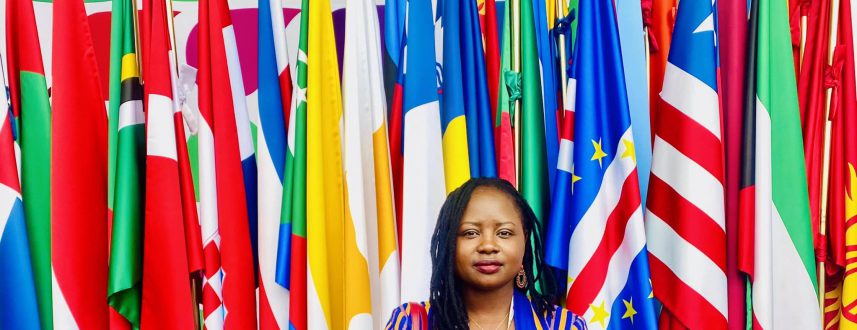Selam at MONDIACULT 2022 in Mexico City
 tisdag 11 oktober 2022 / /
Tags: PANAF
tisdag 11 oktober 2022 / /
Tags: PANAFOur regional programme director Lucy Ilado was part of the just concluded UNESCO’s World Conference on Cultural Policies and Sustainable Development MONDIACULT 2022 in Mexico City between 28 and 30 September. She participated in a panel discussion on 28 September organised by the governments of Denmark, Finland, Iceland, Norway, and Sweden, with support from the Nordic Council of Ministers. The discussions, titled Strengthening Cultural Policies to Promote Artistic Freedom, zoomed in on the effective tools needed to support cultural policy makers to ensure freedom of expression, including artistic freedom.
In her introductory remarks, she said that the freedom of artistic expression is still under threat, particularly when it challenges or criticises political ideology, religious convictions, or social and cultural preferences. It is currently a regular trend that as these rights are undermined, democracy and good governance are also shrinking, necessitating the protection of the right to free speech.
In her contribution to the panel discussion, she highlighted the lack of a proper and continuous Monitoring and Documentation of artistic rights violations on the continent. She noted the necessity for a database to track these violations by giving users access to reliable information and increasing awareness of the conditions, victims, and patterns of violations. The data will therefore make it possible for human rights advocates and the wider community to access, analyse, come up with interventions for violations like incarceration,, the cancellation of performances, and in some cases, killings.
Another area of emphasis should be on Education for artists. She stated that in order to address this issue, artists need to be made aware of their rights and the tools presently available to them. Only then will they be able to lobby the government for a favourable environment in which to create, produce, and disseminate their material. Policy makers also need to be educated to be able to make informed choices. The Pan African Network for Artistic Freedom (PANAF) will follow this approach after the research is done later this year. PANAF is a new network-building initiative funded by the Swedish Arts Council and seeks to create a Pan-African inclusive voice for organisations connecting African artists and culture producers defending artistic freedom. It is being developed in collaboration with partners in Nigeria, Gambia, Mozambique, Zambia, Rwanda, Kenya, Uganda, and Ethiopia, with plans to involve several other countries in the future.
On the continent, copyright legislation and ensuing execution continue to be major issues, costing artists millions of dollars in unpaid royalties. In her opinion, there’s a need for Intercontinental Harmony in terms of how copyright is domesticated. Many Creative and Cultural industries rely on copyright however, evidence shows that countries are at different stages of implementing copyright policies. She noted that most African nations have not yet passed legislation to safeguard cultural creations in the digital sphere. For instance, platforms like Facebook are paying artists and journalists in countries like France and Germany due to European copyright directives. That is an example of a practice that facilitates absolute remuneration online and in Africa we do not have that. However, the absence of such regulations offers favourable conditions for a strong lobby in intercontinental harmony of policies. If the EU consistently outperforms Africa in terms of copyright enforcement, then Africa must intensify its efforts to foster environments that support cultural practices.
In concluding the discussion, she spoke of the need for more Investment in Partnerships between cultural institutions in Africa and those from other continents. Africa requires investment in those kind of trans-boundery partnerships because they also provide platforms for joint collaboration in education and an opportunity to develop the same reforms in terms of the distribution role of cultural industries
The Mondiacult brought together representatives of 150 states who unanimously adopted an ambitious Declaration for Culture at the end of the three-day conference stating that culture is a “global common good and therefore must enter fully into the UN’s next list of Sustainable Development Goals. Among the values of culture on which humans have a right to rely are mentioned: social and economic rights of artists, artistic freedom, the right of indigenous communities to safeguard and transmit their ancestral knowledge, and the protection and promotion of cultural and natural heritage. The Declaration “also calls for substantive regulation of the digital sector, particularly major platforms, for the benefit of online cultural diversity, artists’ intellectual property rights and equitable access to content for all.”
UNESCO will host the World Forum on Cultural Policies every four years.

